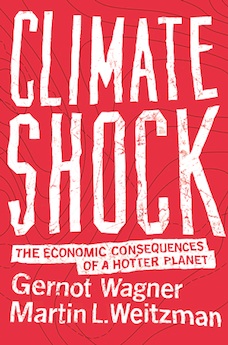By Benjamin Franklin Martin
Gernot Wagner and Martin L. Weitzman (ΦBK, Swarthmore College, 1963) begin by declaring that the problem of climate change is “uniquely global, uniquely long-term, uniquely irreversible, and uniquely uncertain.” Then, in what makes Climate Shock such a valuable contribution to the debate about this critical issue, they clarify the stakes brilliantly.
The carbon dioxide concentration in the atmosphere, the most important cause of climate warming, is already close to 400 parts per million, compared to the preindustrial level of 280 parts per million. As a direct result, global average temperatures will “likely” rise between 1.5° and 4.5°C (2.7° and 8°F). The last time such conditions prevailed on the earth was three million years ago during the Pliocene epoch, with sea levels as much as 20 meters (66 feet) higher. Climate scientists warn that any warming beyond 2°C (3.6°F) will bring “catastrophe” and estimate that the chance of an eventual temperature rise exceeding 6°C (11°F) is at least 10 percent.
Wagner and Weitzman are economists and thus seek economic solutions. They propose to reduce the total of emissions through a tax on the burning of carbon ($40.00 per ton) and through a system of “cap and trade” (under which burners of carbon keeping their emissions below a “cap” level can “trade” the unused portion for financial gain). They insist that given the dire predictions, failing to act would be “willfully blind.”
Benjamin Franklin Martin (ΦΒΚ, Davidson College, 1969) is the Price Professor of History at Louisiana State University and a resident member of the Beta of Louisiana Chapter of Phi Beta Kappa.




